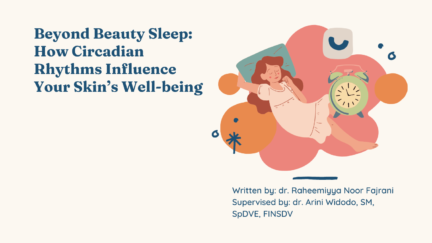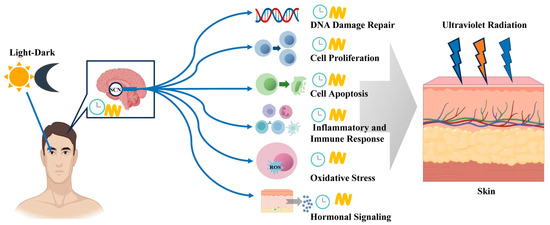Have you ever wondered why your skin seems to glow and heal better after a good night’s sleep? It turns out, your body’s internal clock—known as the circadian rhythm—plays a powerful role in how your skin repairs itself.
This natural cycle controls when your skin can best fix damage, regenerate cells, and fight off the effects of daily stress and sun exposure. If you want to unlock the secret to healthier, more youthful skin, understanding how your circadian rhythm influences skin repair is key.
Keep reading to discover how syncing with your body’s natural timing can transform your skincare routine and boost your skin’s natural healing power.
Skin Damage And Circadian Rhythm
The skin’s ability to repair itself follows a natural daily cycle known as the circadian rhythm. This internal clock controls many processes, including how the skin responds to damage. Understanding this rhythm helps reveal why skin damage occurs and how repair happens at different times of the day.
The skin faces constant threats from the environment, especially from ultraviolet (UV) rays. Damage caused by UV exposure affects the skin’s DNA, increasing the risk of aging and other problems. The circadian rhythm influences how the skin handles this damage and when it can repair most effectively.
Uv Exposure And Dna Damage
UV rays from the sun cause direct harm to the skin’s DNA. This damage can lead to mutations and skin aging. The skin’s sensitivity to UV damage changes throughout the day. During daylight, the skin absorbs UV light, which triggers DNA damage.
Studies show that skin cells accumulate damage during the daytime. This damage does not stop when the sun sets. DNA harm continues to affect cells even in the absence of light. The circadian rhythm controls how much damage the skin can handle before repair starts.
Nighttime Repair Mechanisms
At night, the body activates key repair processes in the skin. DNA repair enzymes work harder during sleep to fix UV-induced damage. This repair peak aligns with the circadian rhythm’s timing.
The skin also increases production of collagen and other proteins at night. These proteins help restore skin strength and elasticity. Low levels of stress hormones during sleep allow better healing and regeneration.
Without proper sleep, these repair mechanisms weaken. This leads to slower healing and more visible skin damage over time. Following a regular sleep schedule supports the skin’s natural repair cycle.

Credit: www.mdpi.com
Sleep And Skin Regeneration
Sleep plays a vital role in skin regeneration. During sleep, the body activates processes that repair and renew skin cells. This natural repair helps maintain a healthy and youthful complexion. The timing and quality of sleep greatly affect how well the skin heals and regenerates.
Role Of Deep Sleep Stages
Deep sleep stages are crucial for skin repair. During this phase, the body releases growth hormones that stimulate cell regeneration. Collagen production increases, which helps keep skin firm and elastic. Blood flow to the skin also improves, delivering nutrients and oxygen. This stage allows the skin to heal from daily damage caused by sun and pollution.
Effects Of Sleep Deprivation On Skin
Sleep deprivation disrupts skin repair processes. Without enough rest, the body produces more stress hormones that break down collagen. This leads to dull skin and fine lines. The skin barrier weakens, causing dryness and irritation. Poor sleep also slows down cell turnover, making it harder for the skin to recover. Over time, lack of sleep can cause premature aging and a tired appearance.
Hormones Driving Nighttime Repair
Hormones play a key role in skin repair during the night. The body’s internal clock controls the release of hormones that help heal and renew skin cells. Nighttime is the prime time for this repair process. Understanding these hormones can help explain why sleep is vital for healthy skin.
Cortisol Reduction Benefits
Cortisol is known as the stress hormone. Its levels drop significantly during sleep. Lower cortisol reduces inflammation and redness in the skin. This calm state allows skin cells to heal faster. It also prevents the breakdown of collagen, a protein that keeps skin firm. Reduced cortisol at night supports a smooth and healthy complexion.
Collagen And Growth Hormone Production
At night, the body produces more collagen and growth hormone. Collagen rebuilds damaged skin and keeps it elastic. Growth hormone helps regenerate new skin cells and muscle tissue. These hormones work together to repair fine lines and wrinkles. Their increased production during sleep leads to fresher, younger-looking skin by morning.

Credit: www.dermapamine.com
Circadian Disruption And Skin Health
Circadian disruption occurs when the body’s natural 24-hour cycle is disturbed. This disturbance affects many processes, including skin health and repair. Our skin depends on this rhythm to heal and regenerate properly. When the cycle is off, skin functions can slow down or worsen.
Factors such as shift work, irregular sleep, and exposure to artificial light at night can cause circadian disruption. The skin may become more vulnerable to damage. Understanding how this disruption affects skin is key to maintaining a healthy complexion.
Impact On Skin Conditions
Disrupted circadian rhythms can worsen common skin problems. Conditions like eczema, psoriasis, and acne often flare up. The skin’s barrier weakens, allowing irritants to penetrate more easily. Inflammation increases, making redness and itchiness worse. Damage from sun exposure also builds up, as repair slows down.
Research shows that skin cell DNA repair peaks at night. Without proper rest, this repair is incomplete. Over time, this leads to premature aging, wrinkles, and uneven skin tone. Circadian disruption also reduces collagen production, vital for skin strength.
Recovery From Rhythm Disruption
Restoring the circadian rhythm helps skin heal and regain balance. Consistent sleep schedules improve the skin’s ability to repair damage. Limiting exposure to blue light before bed supports natural hormone release. These hormones promote skin regeneration and reduce stress effects.
Healthy habits like a balanced diet and hydration also aid recovery. The skin can bounce back faster with proper care. Recovery varies but often starts within days of resetting your sleep pattern. Small changes lead to visible improvements in skin health.
Optimizing Skin Repair With Circadian Science
Optimizing skin repair by using circadian science offers a fresh approach to skincare. The skin follows a natural 24-hour cycle that controls repair and regeneration. Understanding this internal clock helps improve how skin heals and stays healthy.
By aligning skincare routines with the skin’s circadian rhythm, damage repair becomes more effective. This science-based method supports the skin’s natural ability to recover from daily stress and environmental damage. It also aids in maintaining a youthful appearance.
Resetting The Skin’s Internal Clock
The skin’s internal clock can become disrupted by poor sleep and irregular routines. Resetting this clock involves creating consistent daily habits. Going to bed and waking up at the same time helps the skin repair processes start on schedule.
Limiting exposure to blue light from screens in the evening also supports this reset. Using gentle skincare products at night enhances the skin’s ability to regenerate. These small changes guide the skin back to its natural rhythm.
Potential Anti-aging Strategies
Anti-aging strategies that respect the circadian rhythm can boost skin repair and reduce signs of aging. Applying antioxidants and repair-focused ingredients at night maximizes their benefits. The skin is more receptive to these treatments during its active repair phase.
Maintaining a healthy sleep schedule reduces cortisol levels, which helps prevent skin breakdown. Encouraging collagen production through nighttime care firms the skin and smooths fine lines. These strategies work best when timed with the skin’s natural cycles.

Credit: www.mdpi.com
Frequently Asked Questions
How Does Circadian Rhythm Affect Skin?
Circadian rhythm regulates skin repair by timing DNA damage repair and collagen production. It boosts nighttime healing and cell regeneration. Disrupted rhythms impair skin health, causing dullness and aging signs. Maintaining a regular sleep cycle supports optimal skin restoration and protection against environmental damage.
Does Skin Regenerate During Sleep?
Yes, skin regenerates during sleep. Nighttime triggers collagen production and DNA repair, enhancing skin healing and rejuvenation.
Why Does My Skin Repair Itself At Night?
Your skin repairs itself at night because the circadian rhythm lowers cortisol and boosts collagen and growth hormone. This enhances cell repair and DNA healing.
How Long Does It Take To Fix Circadian Rhythm?
Fixing your circadian rhythm usually takes a few days to two weeks. Consistent sleep schedules speed recovery.
What Is Circadian Rhythm’s Role In Skin Repair?
Circadian rhythm controls skin cell repair, making regeneration peak during nighttime hours.
How Does Skin Regenerate During Sleep?
Skin cells renew and heal mostly during deep sleep stages at night.
Conclusion
The circadian rhythm plays a key role in skin repair and health. Skin cells work best at night to fix daily damage. Sleep supports this natural healing by lowering stress hormones. Keeping a regular sleep schedule helps maintain this repair cycle.
Disruptions can slow down skin regeneration and cause dullness. Simple habits like good sleep and sun protection aid skin recovery. Understanding your body’s clock benefits your skin’s appearance and strength. Rest well to help your skin glow and stay healthy.
 Skip to content
Skip to content